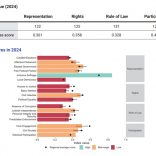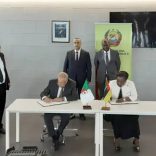Mozambique: Wounds, latent tension mark 50 years of independence - CC President
Mozambique Elections: Is the CNE obliged to check polling notices or not?

FILE - For illustration purposes only. [File photo: DW]
The National Elections Commission of Mozambique (CNE) publicly confirmed a few days ago that it did not check the polling station ‘notices’, and that it is not legally obliged to do so. A lawyer interviewed by DW Africa disagrees.
The CNE’s statement reads: “For the purposes of the central counting of the results of local elections, the law is clear in dispensing with the notices and minutes of the polling station (which are kept by the District Elections Commission), using the intermediate counting, carried out by district, for the purposes of general clearance.”
READ: Mozambique Elections: CNE claims it does not have to check polling station results sheets – AIM
The statement came after the Constitutional Council last week requested more notices and minutes from the CNE, following opposition complaints of irregularities in the vote. The CNE then asked for more time to deliver the documents, on the grounds that the country “is vast”.
Mozambican lawyer Victor da Fonseca does not agree with the position taken by the CNE, holding that the CNE that is responsible for keeping and preserving the minutes and notices of polling stations. What does the electoral law say?
DW Africa: How should the results of local elections be determined, from voting to validation by the Constitutional Council?
Victor da Fonseca (VF): We are saying that at the time of the election of presidents at district level, the minutes must be prepared as well as the notices and forwarded to the National Elections Commission, the competent entity to be able to organize and take care of this material. Why do I say this?
Article 123 of the electoral law recommends something fundamental but which, it seems, at this moment, the National Elections Commission and the Constitutional Council are not verifying, for example, when it says that the destination of the documentation – from the minutes and notices of the district and city elections commissions for the general count – is under the custody and conservation of the CNE, which is a competent entity to take care of this information. In general terms, this means that the competent entity for the general count is the National Elections Commission, which must carry out the general count based on the information given to it by the District Elections Commission.
DW Africa: Does this mean that in the dossier to be processed by the National Elections Commission, there must necessarily be the presence of notices and minutes issued from the voting table/polling station?
VF: Naturally! Because it is the competent entity to take care of all this information, as I mentioned. Article 123 of the Electoral Law states that the minutes and notices of the district and city elections commissions for general counting are kept by the National Elections Commission. Therefore, this is the competent entity that must take care of this information, by the date of disclosure it must already have this information. In other words, when delivering intermediate tabulation material within 24 hours of the publication of the results of the intermediate tabulation, the president of the district or city election commission must personally deliver the ballot boxes and the minutes of the notices and notebooks to the National Elections Commission or the Provincial Elections Commission or the city of Maputo.
DW Africa: In a clarification note addressed to a newspaper in Mozambique, the National Elections Commission says that, “for the purposes of centrally tabulating the results of local elections, the law is clear in dispensing with the ‘editais’ and minutes of the polling station”. What do you have to say about this CNE statement?
VF: The National Elections Commission brought deliberation number 60, of September 16, which refers to the intermediate district or city tabulation of the results. And it also says that at this level it is preceded by re-appreciation. So, we are saying that these polling station ballots in relation to which there has been a protest must be re-examined. So, all these documents must be sent to the National Elections Commission so that it can investigate.
DW Africa: In short, are we saying that there is no phase in which the use of notices or minutes produced at the Polling Station is exempt?
VF: There’s no way. It is important they be there, as proof as to what was done.
ALSO READ: Mozambique Elections: Lawyers see errors in CC’s rulings on district courts













Leave a Reply
Be the First to Comment!
You must be logged in to post a comment.
You must be logged in to post a comment.